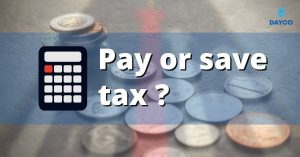Should I pay or save tax
![]() June 2, 2023
June 2, 2023
![]() 0 Comments
0 Comments
Should I pay or should I save taxes? If that is your dilemma, then you can take solace from the fact that even Benjamin Franklin, the founding father of the United States of America, faced the same tough choice way back in 1789 when in a letter he wrote to Jean-Baptiste Leroy about the new constitution of his country, ‘...nothing is certain except death and taxes.’
Income taxes are unavoidable. But the question is: should one pay it or invest in specified instruments to save one’s tax outgo?
Under the law of the land, you need to pay tax to the government on earnings above a threshold, called the basic exemption limit. However, the income tax law also enables you to lower your tax liability by claiming rebates and deductions on specified spending and investments.
In other words, if you want to reduce your tax liability, you’ll have to part with your gross income and settle with lower disposable income to spend on consumption and so on.
So, the moot point boils down to a single question: Do you want to live with a lower disposable income in order to save tax? If yes, then go for tax-saving investments. Otherwise, pay tax and have a higher income in hand to spend with.
Let us illustrate this point with a simple example.
Foremost, it is to be noted that the new taxation regime, introduced in the Union Budget 2020, does away with 70 most common tax deductions in lieu of offering a lower tax rate. So, if you want to lower your tax outgo through tax-saving investments, you can do so only under the old tax regime.
The income slabs and corresponding tax rates are given below.
- For resident individuals below 60 years of age and HUF:
| Annual income | Income tax rate |
| Rs 2.5 lakh or less | No Tax |
| Rs 2.5 lakh to Rs 5 lakh | 5% |
| Rs 5 lakh to Rs 10 lakh | 20% |
| Rs 10 lakh and above | 30% |
2. For resident individuals between 60 and 80 years of age:
| Annual income | Income tax rate |
| Rs 3 lakh or less | No Tax |
| Rs 3 lakh to Rs 5 lakh | 5% |
| Rs 5 lakh to Rs 10 lakh | 20% |
| Rs 10 lakh and above | 30% |
3. For individuals above 80 years of age:
| Annual income | Income tax rate |
| Rs 5 lakh or less | Nil |
| Rs 5 lakh to Rs 10 lakh | 20% |
| Rs 10 lakh and above | 30% |
Given that a taxpayer having a ‘total income’ not exceeding Rs 5 lakh in a financial year can claim a maximum rebate of Rs 12,500 under Section 87A from his/her total tax liability, individuals having annual income upto Rs 5 lakh doesn’t need to worry about tax saving investments.
This will be still higher for salaried people, who can avail of a standard deduction of Rs 50,000 and annual EPF contribution (mandatory for salaried people) to arrive at ‘total income’.
4.Steps to claim tax rebate u/s 87A:
| Source of income | Income (Rs) | |
| Salary | 6,00,000 | |
| Less: Standard deduction | 50,000 | 5,50,000 |
| Interest on bank deposits | 15,000 | |
| Gross total income | 5,65,000 | |
| Less: deduction in respect to contribution to provident fund under Section 80C | 40,000 | |
| Deduction in respect of health insurance premium under Section 80D | 25,000 | 65,000 |
| Total income | 5,00,000 | |
| Total tax liability* | 12,500 | |
| Less: tax rebate u/s 87A | 12,500 |
Thus, individuals having salary income upto Rs 6 lakh a year do not actually need to worry about tax-saving investment.
However, even if you earn more than Rs 6 lakh a year, you can still weigh the options of paying taxes or saving it via specified investments that will not allow you to withdraw money for a minimum of 3 years!
For example, if you have a salary income of Rs 12 lakh per annum, then after availing the benefits of standard deduction, premium payment for health insurance and repayment of interest and principal towards a housing loan, your tax liability will be as shown below.
| Source of income | Income (Rs) | |
| Salary | 12,00,000 | |
| Less: standard deduction | 50,000 | |
| Gross total income | 11,50,000 | |
| Less: contribution towards EPF u/s 80C | 50,000 | |
| Housing loan principal u/s 80C | 1,00,000 | |
| Housing loan interest u/s 24 | 2,00,000 | |
| Health insurance premia u/s 80D | 25,000 | |
| Total taxable income | 7,75,00 | |
| Tax liability* | 67,500 |
Here, you have to pay a tax of Rs 67,500 while your disposable income before tax has come down to Rs 8,25,000. If you subscribe to the National Pension System, you can claim tax deduction of additional Rs 50,000 (or tax saving of Rs 10,000) under Section 80CCD(1B).
The question is: to save Rs 10,000 in tax, can you commit Rs 50,000 every year for NPS contribution, over and above your home loan EMI and health insurance premium?
Or would it not be better to pay the tax and have with you the money that you can spend anywhere you like? Think again.
If you have a question, share it in the comments below or DM us or call us – +91 9051052222. We’ll be happy to answer it.
- Parichoy Gupta
Share With
I'm a cool paragraph that lives inside of an even cooler modal. Wins!
Are you sure?
In case you didnt know, you can open your account online within 24 hours. Offline account opening takes up to 4 working days. If you wish to open your account offline, fill and sign the forms using a black/blue ballpoint pen. Please fill in the email and mobile number of the applicant to avoid account opening delays.
Enter Password
Please enter your details and password
New to Dayco?
Enter Password
Please enter your details and password
New to Dayco?
Filing Complaints on SCORES (SEBI) – Easy & Quick
- Register on SCORES Portal (SEBI)
- Mandatory details for filing complaints on SCORES:
- Name, PAN, Address, Mobile Number, E-mail ID
- Benifits:
- Effective Communication
- Speedy redressal of the grievances
Thanks !!
Your details were successfully received.

Thank you for Your Feedback!
Our Team is working constantly on improving our user experience and your feedback really means a lot.
Thanks !!
App Link Send to your mobile number successfully.
Thank You
All your Questions have been recorded
Thank You
All your Questions have been recorded
Thank You!
Thank you for your response. We'll get in touch with you at the earlisest for your investment planning needs
NEXT
Thank You!
Thank You for your interest in our Moderate Equity Portfolio. Please find below the credentials to track this portfolio:
User ID: mockmod@daycoindia.com
Password: abcd@1234
Portfolio Tracker
Please Read!
Risk profiling is crucial for identifying and managing potential risks in investment decisions. Please carry out your risk profiling before making any investment decisions.
Complete Risk Assessment Now
Thank You !!
Please enter your details to download/print the report
Thank You !!
Please enter your details to download/print the report
Thank You !!
Please enter your details to download/print the report
Thank You !!
Please enter your details to download/print the report
Thank You !!
Please enter your details to download/print the report
Set Your Goal
Please Select an option from below
Set Your Goal
Please Select an option from below
Thanks You !
We appreciate your interest in our services. Our team will be in touch with you shortly.
CloseSet your Goal
Please enter your details in the fields provided
Thanks You!!
Calculation report has been sent to your mail id successfully
Clear form?
This will remove your answers from all questions and cannot be undone.



 Book Appointment
Book Appointment









Leave a Reply